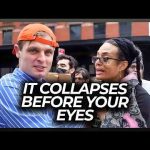Palestinians in Gaza have recently protested against Hamas, marking the largest demonstrations since the war began. Hundreds gathered in Beit Lahia, Jabalia, Khan Younis, and elsewhere, holding signs like “Hamas out” and demanding an end to the war. These protests reflect frustration over renewed Israeli airstrikes, displacement, and food shortages after the collapsed ceasefire. While some view the rallies as organic anger toward Hamas’s governance, others note Israel and the Palestinian Authority may have encouraged them to undermine the group. :
– : Many Gazans returning to ruined homes during the ceasefire faced renewed bombing, fueling desperation. One protester said, “Protest won’t stop the occupation, but it can affect Hamas”.
– : While some genuinely blame Hamas for the war, Palestinian analysts suggest Israel and PA loyalists may have infiltrated rallies to amplify anti-Hamas messaging.
– : The group initially ignored protests but later framed them as anti-war rallies, avoiding violent crackdowns to avoid global scrutiny. Still, leaked social media posts show growing civilian blame toward Hamas for prolonging suffering.
:
Despite the outrage, experts caution Hamas isn’t near collapse. The protests are smaller than pre-war demonstrations, and Hamas retains military control. Longtime Gaza observer Ahmed Fouad Alkhatib noted, “These protests don’t mean Hamas will fall overnight”. Israel sees an opening but risks discrediting demonstrators if it openly supports them.
:
The administration has detained and sought to deport activists like Mahmoud Khalil (Columbia) and Rumeysa Ozturk (Tufts), alleging ties to Hamas. Secretary of State Marco Rubio revoked over 300 student visas under a law allowing removals for “adverse foreign policy consequences”. Critics argue this criminalizes pro-Palestinian speech:
– : A green card holder arrested without charges, accused of “supporting Hamas” through protests. ICE initially tried revoking his student visa, then switched to targeting his permanent residency.
– : The ACLU and NYCLU joined Khalil’s legal team, calling his detention retaliation for activism. Law professors warn the policy could let the government deport lawful residents for political views.
:
While Gaza’s protests signal cracks in Hamas’s authority, Israel’s bombardment and U.S. crackdowns risk radicalizing more Palestinians. As Trump accelerates deportations, courts will decide if activism constitutes terrorism—a ruling that could redefine free speech protections for non-citizens. For now, Hamas survives, but the U.S. and Israel are testing new pressure tactics with unpredictable consequences.




